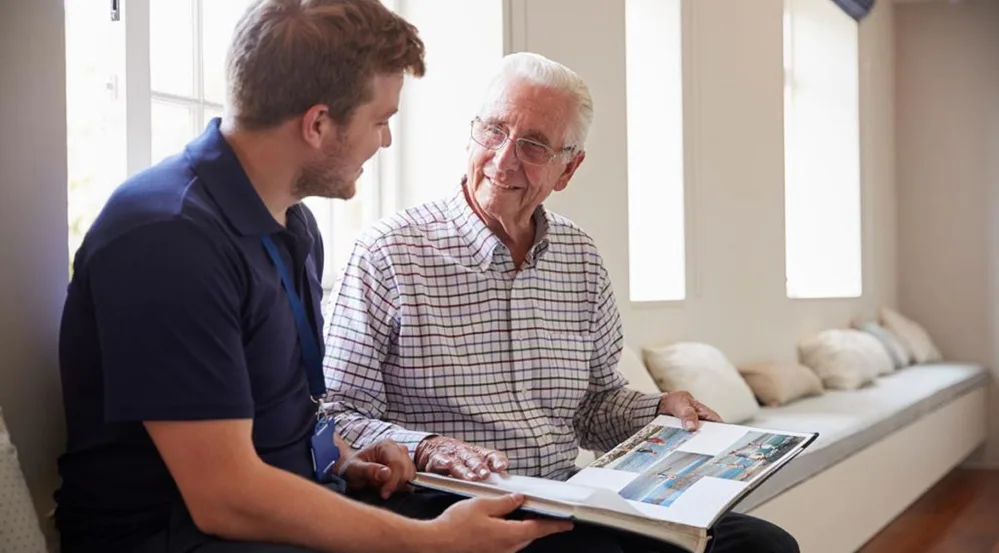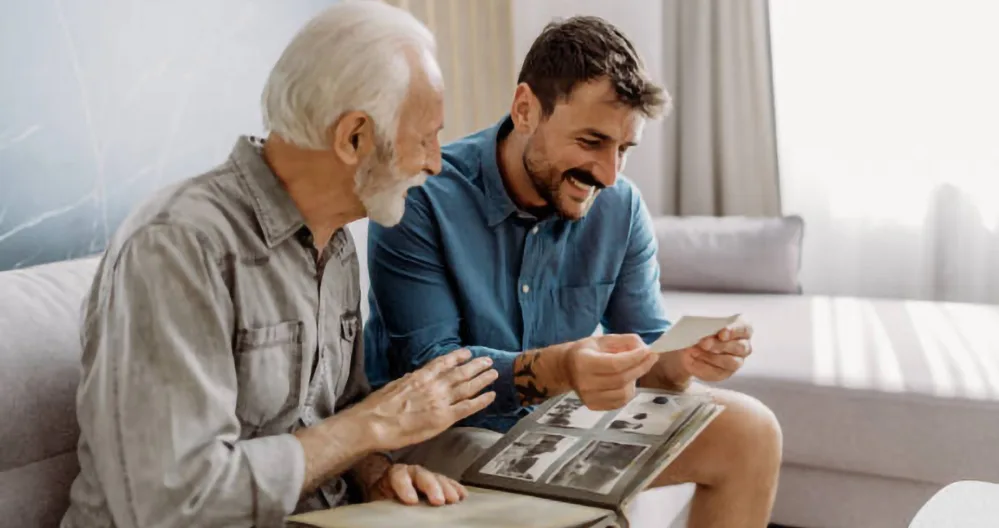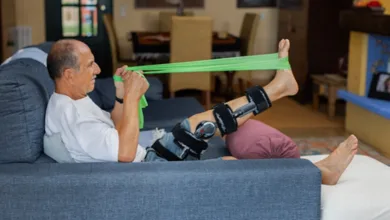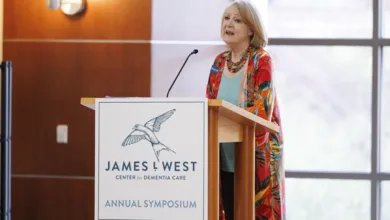Dementia and Unbreakable Love: Walking with Shadows

It started with little things—misplaced keys, repeated questions, names that didn’t come as quickly. At first, Hallie chalked it up to normal aging. Everyone forgets things now and then, right? But something felt different. Deep down, she knew. Her mother, who once ran their household with grace and precision—never missing a birthday, always on top of the details—was starting to slip in hard-to-ignore ways.
Watching someone fade away while still physically present is one of the most painful emotional journeys a person can endure. Dementia is a thief; it doesn’t steal everything at once — it nibbles away at memories, identity, and connection until all that remains are shadows of the person once known.
This remembrance reflects the toll dementia takes on families, the resilience it demands, and the heartbreaking beauty still found in the smallest moments.
The day her mother forgot her name
It happened on a sunny Tuesday afternoon.
Hallie had stopped by with yellow tulips and a lemon tart — her mother’s favorite. Her mother smiled, but it wasn’t the kind of smile that said, “My daughter is here.” It was polite. Distant.
“You’re very kind,” her mother said. “What did you say your name was again?”
Everything inside Hallie shattered. She didn’t say, “Mom, it’s me!” She just stood there, stunned, watching the woman who once kissed her goodnight a thousand times now struggle to place her.
That moment marked the beginning of the unraveling.
Hallie began journaling, chronicling the clarity and confusion. Some days, her mother told childhood stories. Other days, she accused Hallie of stealing her purse or sat blankly for hours.
Dementia is not linear. It offers glimmers of hope one day and heartbreak the next.
Hallie learned to cherish the good days. She learned to cry in the shower, scream into pillows, and smile through the pain. Her mother needed her to be strong — even when she felt like she was breaking.
Understanding dementia
Before her mother’s diagnosis, Hallie believed dementia was merely memory loss. However, she soon discovered that it is much more complex.
Dementia is an umbrella term for symptoms that significantly affect memory, thinking, and social abilities, severely interfering with daily life. According to the World Health Organization, over 55 million people worldwide live with dementia, with nearly 10 million new cases diagnosed each year.
Types of dementia:
- Alzheimer’s Disease: The most common form, marked by memory loss and cognitive decline.
- Vascular Dementia: Often follows a stroke and involves reduced blood flow to the brain.
- Lewy Body Dementia: Includes hallucinations and symptoms similar to Parkinson’s disease.
- Frontotemporal Dementia: Affects behavior, language, and personality.
Regardless of their differences, all forms of dementia gradually erode a person’s identity.
The impact on family and caregivers
Dementia not only changes the life of the diagnosed but also transforms family dynamics.
When her mother’s condition worsened, Hallie and her siblings had to decide who would provide care. Hallie stepped forward, unaware of how much her world would shrink.
Initially, it meant gentle reminders and assistance with daily tasks. However, over time, she helped her mom with diaper changes, mood management, and calming hallucinations. She left her job and dedicated her days to caregiving. It was an act of love that brought profound exhaustion.
The emotional and physical toll
Hallie felt a flood of emotions: sadness for what was lost, guilt for her impatience, frustration, and anger at the disease. Friends stopped calling, and invitations were turned down. She felt her own identity start to fade away.
Dementia care also incurs significant financial costs. The average lifetime expense of care surpasses $375,000, excluding lost income from diminished work Hours.
No matter how she tried to shake it off, Hallie couldn’t help but feel invisible. People asked about her mom, of course—but rarely about how she was coping. She understood that. Still, caring for a loved one can be a heavy load.
In her research, she later discovered that as many as 60% of dementia caregivers suffer from depression. This is understandable; the emotional toll is significant, even if it frequently remains unacknowledged.

When roles reverse
One of the most jarring shifts was becoming a parent to her mother. Bathing her for the first time brought tears to both of them.
As time passed, Hallie learned to navigate this new reality. She became her mother’s voice, memory, and decision-maker. Her mother’s life needed to be planned, monitored, and protected.

Finding strength in routine
Routines became their anchor.
The days started with soft jazz, followed by leisurely walks in the garden. Meals were arranged at regular times. Afternoons were devoted to puzzles or photo albums. Nights concluded with classic films.
Even the slightest disruption could cause confusion or agitation. The house was redesigned for safety: rugs were removed, knives were hidden, and cabinets were locked.
Moments that shattered her
Some memories will always endure.
- The time her mother wandered barefoot down the street, calling for her long-deceased mother.
- A birthday lunch during which her mother whispered, “I don’t know who you are, but you seem sad.”
- Mistaking Hallie for her sister and asking where her children were.
These moments shattered her. She cried in private and returned the next day, ready to support her mom in any way to make her feel loved and not alone.
Holding on to what remains
Nevertheless, moments of connection remained.
Music played a vital role. Her mother could still sing along to songs from the 1960s. Familiar scents, cherished photos, and beloved objects sparked flashes of recognition.
A beloved teacup. The smell of apple pie. Small things brought her mom back, and that familiar sparkle returned to her eyes for a moment. They were fleeting—but deeply satisfying.
Conclusion: love in the time of forgetting
Dementia teaches that love is more than shared memories. It’s presence and patience. It’s choosing to show up again and again, even when the person you love no longer knows your name.
Hallie’s journey changed her. It made her more compassionate, grounded, and grateful for the smallest gestures.
If you’re caring for someone with memory loss, it helps to know where to turn. For gentle guidance and local support, visit seniorcarefrisco.com.

FAQs: Understanding Dementia and Caregiving
- What are the early signs of dementia?
Early signs often include memory loss, difficulty finding words, mood changes, confusion regarding time or place, and challenges performing familiar tasks. If you notice these signs in a loved one, consult a doctor promptly. - How can I support a loved one with dementia?
Create a structured environment, maintain a consistent routine, engage with familiar music and photos, practice patience, and seek support from others who are experiencing similar challenges. - Are there treatments that can reverse dementia? Currently, there is no cure for most types of dementia, including Alzheimer’s. However, specific treatments and lifestyle changes may slow its progression and improve quality of life.
- What resources are available for caregivers?
Check for local caregiver support groups, online communities, respite care programs, and counseling services. Organizations such as the Alzheimer’s Association offer guides, helplines, and tools. - Is dementia preventable?
There is no guaranteed method to prevent dementia, but maintaining a healthy lifestyle—such as a balanced diet, regular physical activity, social engagement, and mental stimulation—may reduce the risk and enhance brain health.





